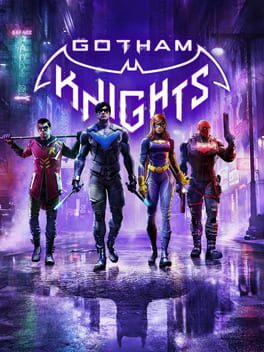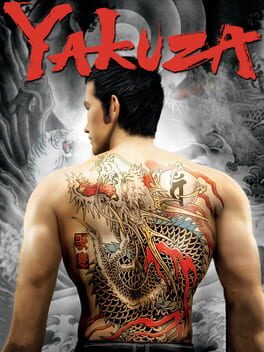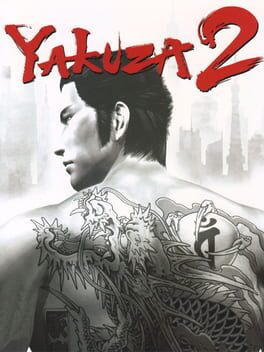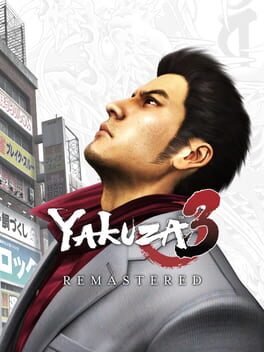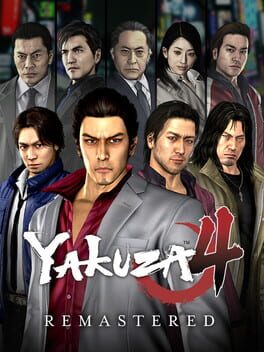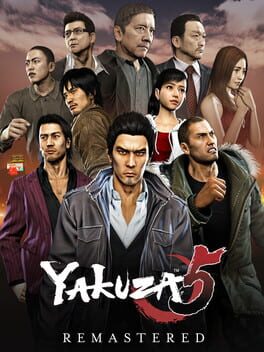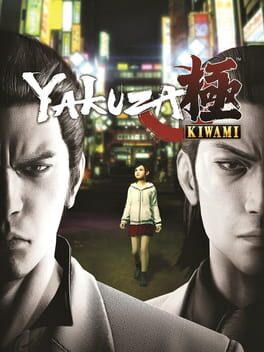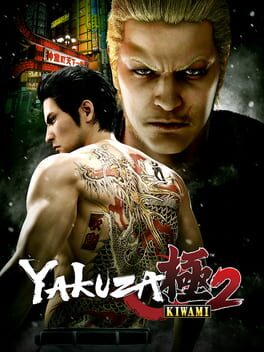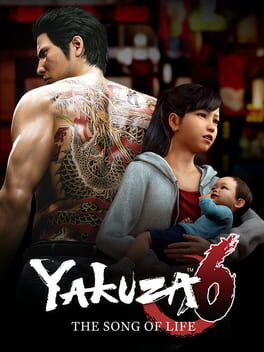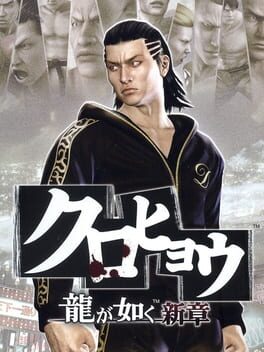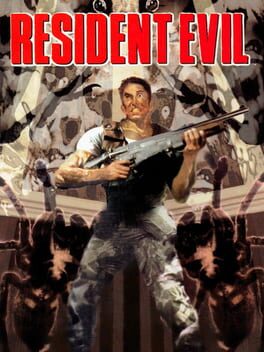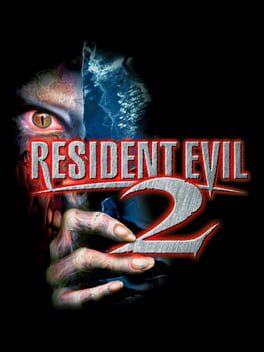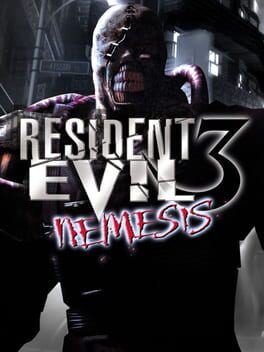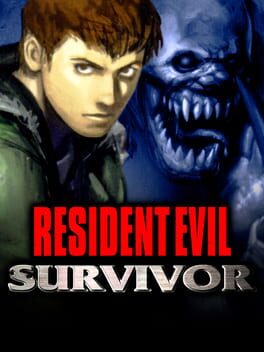Murph04
2022
2005
Yakuza 1 has a good foundation for building a future series.
The fighting is weighty and violent, the characters are likeable and memorable, and the story builds intrigue easily.
Issue is, the combat also has a feeling of stiffness, where you're either trapping an enemy in the corner and beating them to paste, or you're constantly swinging at air because there's no real lock-on or tracking for your punches. You'll also be getting into a lot of random fights, hearing the same generic dialogue, and executing the same combos.
The story is much the same way. It starts real strong, setting up pieces and intrigue and motivations, but just when it's reeling you in and you think you're about to get payoff it throws you into a series of fetch quests to pad for time and that promised payoff turns into a "Our Princess is in another castle" scenario. The characters I thought were going to be the main antagonists take a backseat in the final act, as it introduces a character out of nowhere to exposit how he was the mastermind all along.
Kiryu is an immediately likeable protagonist, and I hope many of the characters that actually survive the finale stick around for sequels.
Like I said it's a good foundation.
The fighting is weighty and violent, the characters are likeable and memorable, and the story builds intrigue easily.
Issue is, the combat also has a feeling of stiffness, where you're either trapping an enemy in the corner and beating them to paste, or you're constantly swinging at air because there's no real lock-on or tracking for your punches. You'll also be getting into a lot of random fights, hearing the same generic dialogue, and executing the same combos.
The story is much the same way. It starts real strong, setting up pieces and intrigue and motivations, but just when it's reeling you in and you think you're about to get payoff it throws you into a series of fetch quests to pad for time and that promised payoff turns into a "Our Princess is in another castle" scenario. The characters I thought were going to be the main antagonists take a backseat in the final act, as it introduces a character out of nowhere to exposit how he was the mastermind all along.
Kiryu is an immediately likeable protagonist, and I hope many of the characters that actually survive the finale stick around for sequels.
Like I said it's a good foundation.
2006
Yakuza 2 is much improved over the first. A more fluid and swift combat system lets you get through the random battles much faster. More things to do around town give you reason and want to explore the area (I killed a solid hour bowling).
Where it's most improved is the story. Yakuza 1 was spent uncovering a mystery where it was just spinning wheels until it decided to give you the answers, and the answers were shit you could have never predicted. Yakuza 2 keeps the focus on the actual Yakuza, with shifting alliances and intrigue and big personalities. It's a great story that kept me hooked until the fantastic climax
....Mostly. Yakuza 2 still has the predecessor's issue with pacing. There is some blatant and unneeded padding in this game. The penultimate chapter is literally "Kill 2 hours doing activities until we're ready to let you play the rest." It can get real frustrating when you're ready to engage in shirtless fisticuffs between two alpha chadsters and then suddenly you have to engage in a one-act subplot about finding an idol agency a new star.
Yakuza 2 has more activities and buckwild side-missions (one involving a Yakuza boss with an infantilizing fetish is a particular highlight) but I quickly realized most of them are just places to dump money. You can manage a cabaret, and even if you make all the right business decisions none of it will matter unless you're dropping hundreds of thousands of yen on your performers to keep them happy, and Yakuza 2 just doesn't have effective ways of making cash so these activities simply become about grinding and oh no I've lost interest.
It's got some great highs and some very disappointing lows. For now I think the story is enough to make me happy, but as I play more of the franchise I could see it slipping.
Where it's most improved is the story. Yakuza 1 was spent uncovering a mystery where it was just spinning wheels until it decided to give you the answers, and the answers were shit you could have never predicted. Yakuza 2 keeps the focus on the actual Yakuza, with shifting alliances and intrigue and big personalities. It's a great story that kept me hooked until the fantastic climax
....Mostly. Yakuza 2 still has the predecessor's issue with pacing. There is some blatant and unneeded padding in this game. The penultimate chapter is literally "Kill 2 hours doing activities until we're ready to let you play the rest." It can get real frustrating when you're ready to engage in shirtless fisticuffs between two alpha chadsters and then suddenly you have to engage in a one-act subplot about finding an idol agency a new star.
Yakuza 2 has more activities and buckwild side-missions (one involving a Yakuza boss with an infantilizing fetish is a particular highlight) but I quickly realized most of them are just places to dump money. You can manage a cabaret, and even if you make all the right business decisions none of it will matter unless you're dropping hundreds of thousands of yen on your performers to keep them happy, and Yakuza 2 just doesn't have effective ways of making cash so these activities simply become about grinding and oh no I've lost interest.
It's got some great highs and some very disappointing lows. For now I think the story is enough to make me happy, but as I play more of the franchise I could see it slipping.
2018
Oh no. None of those plot threads had anything to do with eachother
Yakuza 3's biggest crime is that a lot of it is very boring. It drops a real intriguing plot hook right at the start, that Kiryu's adopted father may have faked his death and also might not be the criminal with a heart of gold we think he is, it then commands you to engage in six hours of Kiryu running an orphanage.
It takes careful time to establish all 10 kids in the orphanage and give each a crisis Kiryu needs to solve ranging from needing to know how to dress cool, to not being racist.
"Ah" says the player who knows how plots work "This is subtly setting up the themes of the story and will tie back to the games climax"
They don't. The long intro with the orphanage exists so that Kiryu has something to rush to defend in the last act. The game could have easily made due with two hours of orphanage plotting and far fewer kids that I don't know the names of.
When you do finally catch up with that plot it teased you 1/3rd average playtime of an Assassins Creed game ago, you find there is little mystery to engage in as the game becomes a series of exposition dumps and convoluted conspiracies that would make Kojima blush. Staple characters of the last two games are either killed off, or sidelined. Even after rewatching cutscenes and consulting the in-game character/relationship flowcharts, I'm still not entirely sure why any of what happened in Yakuza 3 needed to happen.
It's just more than a little confusing when the last act builds to an emotional climax for a character that's had 5 minutes screentime and the big bad is some rando voiced by a guy that I'm 78% certain is Crispin Glover's brother.
That all said, the game has some real high points. It certainly has the best boss fights in the series, for the first time actually achieving a feeling of trading blows and outmaneuvering an equally-matched opponent.
There are more things to do than ever and my timesinks this time around were golf and darts (they did something to the bowling. I can't determine what, but it's no longer fun).
There are roughly 600 side-stories to explore and even though I only did, like, 7 or 8, they were always engaging enough.
And while I dunk on the story for not connecting or paying off, the individual scenes still have excellent production from the minute character acting and voice performances. The ending has nothing to do with what came before it, but it would be easy to be fooled into thinking it did as the music swells and Kiryu starts dropping truth bombs on the value of being an honorable man.
It's leaving a bad taste in my mouth, but I can't deny the visible effort that's here. I want to like it, but it's not making it easy to.
Yakuza 3's biggest crime is that a lot of it is very boring. It drops a real intriguing plot hook right at the start, that Kiryu's adopted father may have faked his death and also might not be the criminal with a heart of gold we think he is, it then commands you to engage in six hours of Kiryu running an orphanage.
It takes careful time to establish all 10 kids in the orphanage and give each a crisis Kiryu needs to solve ranging from needing to know how to dress cool, to not being racist.
"Ah" says the player who knows how plots work "This is subtly setting up the themes of the story and will tie back to the games climax"
They don't. The long intro with the orphanage exists so that Kiryu has something to rush to defend in the last act. The game could have easily made due with two hours of orphanage plotting and far fewer kids that I don't know the names of.
When you do finally catch up with that plot it teased you 1/3rd average playtime of an Assassins Creed game ago, you find there is little mystery to engage in as the game becomes a series of exposition dumps and convoluted conspiracies that would make Kojima blush. Staple characters of the last two games are either killed off, or sidelined. Even after rewatching cutscenes and consulting the in-game character/relationship flowcharts, I'm still not entirely sure why any of what happened in Yakuza 3 needed to happen.
It's just more than a little confusing when the last act builds to an emotional climax for a character that's had 5 minutes screentime and the big bad is some rando voiced by a guy that I'm 78% certain is Crispin Glover's brother.
That all said, the game has some real high points. It certainly has the best boss fights in the series, for the first time actually achieving a feeling of trading blows and outmaneuvering an equally-matched opponent.
There are more things to do than ever and my timesinks this time around were golf and darts (they did something to the bowling. I can't determine what, but it's no longer fun).
There are roughly 600 side-stories to explore and even though I only did, like, 7 or 8, they were always engaging enough.
And while I dunk on the story for not connecting or paying off, the individual scenes still have excellent production from the minute character acting and voice performances. The ending has nothing to do with what came before it, but it would be easy to be fooled into thinking it did as the music swells and Kiryu starts dropping truth bombs on the value of being an honorable man.
It's leaving a bad taste in my mouth, but I can't deny the visible effort that's here. I want to like it, but it's not making it easy to.
2019
The end of every Yakuza game is usually a moment where the game tries to ratchet up the ante by having a massive exposition dump where it's revealed the illuminati are involved and the entire plot was just a 5D chess move of the real mastermind.
Yakuza 4 doesn't do that. It doesn't need to. It revealed it's true mastermind a while ago and has their motivations and machinations tie directly to the plot up till that point.
Indeed, all that happens in the final chapter of Yakuza 4 is it's 4 protagonists stepping out of a helicopter in their Sunday best while one smugly declares "Alright, everyone pick a butt to kick." Leading to each of them squaring off against their narrative foil.
This bucking of series pitfalls is seen across the game. Each of the previous entries I heavily criticized for abysmal pacing, especially how they will distract their already gripping narratives with weak tangents. Yakuza 4 doesn't do that. Each of it's 4 protagonists have about 5 hours of story content before you leave them to explore the next one in the list. The game takes the bold approach of not having you play series lead Kiryu until the final moments, having him act as the cavalry to rescue the previous 3.
Much like Kiryu in his first outing, these 3 new protags are immediately likeable with their own quirks and casts.
Akiyama, the money-lender with a heart of gold and straight-up Spike Spiegal clone. Saejima, legendary hitman haunted by his past and on a quest for answers. Tanimura, immigrant beat cop who's pursuit of his father's killer leads to uncovering a web of corruption (this game is exceptionally ACAB)
The game is masterful in how it gets you to experience the same mechanics and city incredibly differently based on who you're playing. Saejima is a wanted criminal, so he can't explore the streets series veterans are used to. Instead he navigates through the sewers and homeless camps, using recyclables in place of currency and not getting access to all the minigames the other protags get.
Tanimura, on the other hand, is a polygot and can access back alleys that make up Tokyo's "Little Asia." He can access all sorts of places the others can't because they don't speak the language. Also because he's a cop he's not attacked by random street thugs and instead has to actively seek out his random encounters by stopping local crimes.
And there's still all the usual side activities and substories, but it never stops the plot dead in its tracks to tell you about them (Hi, Yakuza 3). In fact, because of how quick feeling every character segment felt I felt more encouraged than ever to seek out this side-content to spend more time with them.
Yakuza 4 is so stupidly good at being a Yakuza game that it genuinely makes me look a little worse upon those that came before it, if only for the reason that it feels like it could have been this well paced all along.
Yakuza 4 doesn't do that. It doesn't need to. It revealed it's true mastermind a while ago and has their motivations and machinations tie directly to the plot up till that point.
Indeed, all that happens in the final chapter of Yakuza 4 is it's 4 protagonists stepping out of a helicopter in their Sunday best while one smugly declares "Alright, everyone pick a butt to kick." Leading to each of them squaring off against their narrative foil.
This bucking of series pitfalls is seen across the game. Each of the previous entries I heavily criticized for abysmal pacing, especially how they will distract their already gripping narratives with weak tangents. Yakuza 4 doesn't do that. Each of it's 4 protagonists have about 5 hours of story content before you leave them to explore the next one in the list. The game takes the bold approach of not having you play series lead Kiryu until the final moments, having him act as the cavalry to rescue the previous 3.
Much like Kiryu in his first outing, these 3 new protags are immediately likeable with their own quirks and casts.
Akiyama, the money-lender with a heart of gold and straight-up Spike Spiegal clone. Saejima, legendary hitman haunted by his past and on a quest for answers. Tanimura, immigrant beat cop who's pursuit of his father's killer leads to uncovering a web of corruption (this game is exceptionally ACAB)
The game is masterful in how it gets you to experience the same mechanics and city incredibly differently based on who you're playing. Saejima is a wanted criminal, so he can't explore the streets series veterans are used to. Instead he navigates through the sewers and homeless camps, using recyclables in place of currency and not getting access to all the minigames the other protags get.
Tanimura, on the other hand, is a polygot and can access back alleys that make up Tokyo's "Little Asia." He can access all sorts of places the others can't because they don't speak the language. Also because he's a cop he's not attacked by random street thugs and instead has to actively seek out his random encounters by stopping local crimes.
And there's still all the usual side activities and substories, but it never stops the plot dead in its tracks to tell you about them (Hi, Yakuza 3). In fact, because of how quick feeling every character segment felt I felt more encouraged than ever to seek out this side-content to spend more time with them.
Yakuza 4 is so stupidly good at being a Yakuza game that it genuinely makes me look a little worse upon those that came before it, if only for the reason that it feels like it could have been this well paced all along.
2019
Alright, I’m gonna try to reign in my negativity.
Yakuza 5’s biggest problem is that the story is bad. I feel confident in saying that. This is a bad, boring story that seeks to tell the biggest Yakuza tale yet. Split across 5 characters in 5 cities (steam page says 10, I don’t know why) the game is essentially an anthology for the first 4 acts before everything attempts to come together in the final chapter (which is just as long as those that preceded it). These individual character stories get better as they go on. I was confused by Kiryu’s chapter, bored by Saijima’s, but Akiyama and Haruka’s Pop Idol Murder Mystery was fun (even if Akiyama has no reason to be here). The best story is saved for last and nearly single-handedly saves the game. Tatsuo Shinada is a tragic dumbass and his story of redemption, betrayal, and found family is where the game is strongest. It is in no way worth having to play through the other chapters that preceded it.
The final chapter itself is a mess. Unlike Yakuza 4, which got right to the point of an 8-Way shirtless man fight, this one muddles around in lengthy cutscenes and confusing plot revelations. Multiple characters die over the course of Yakuza 5, except not really because you can just walk off multiple gunshot wounds. The final boss may be the best spectacle in the series, but narratively and thematically it makes 0 damn sense.
Because each act takes place in a new city, with a new cast, introducing new mechanics and mini-games specific to that character it means the game is in a constant state of tutorializing and expositing. By the time I was in the last chapter I had forgotten most everything that had happened in the first.
Mechanically, Yakuza 5 boasts the best combat so far. Everything is snappy and quick. The punches are the punchiest. The heat moves the most brutal. You can get a lightsaber. All good stuff. Its also the same light, light, heavy, heavy combo combat I’ve been doing since Yakuza 1 on the PS2. There’s a lot of avenues in this game to get stronger. Secret moves and weapons to unlock, mountains of XP to be gained from side-quests, but it doesn’t matter because light, light, heavy, heavy will serve you through every single combat encounter (provided you also get a generous supply of healing items, which are cheap as dirt to acquire). I desperately need the combat in this series to get a revamp.
What I can’t knock Yakuza 5 for is ambition. There is so much shit to do, including the entirety of Virtua Fighter 2, chicken racing, underground pool tournaments, air hockey, less-than-crazy taxi, etc. Each character gets an entire side-game devoted to them. Street Racing, Hunting, Idol performances, and baseball. Each is surprisingly complex with their own set of skills and unique items to unlock.
I didn’t really do any of them.
And maybe that’s why Yakuza 5 didn’t really rub off on me. I’ve seen some fan reviews that say if you take your time and explore everything its the best in the series, but if you just rush from story mission to story mission its one of the worst. My counter to that is this game took me 35 hours to beat even when I was rushing from story mission to story mission.
If the game had a shorter story I might have finished early and felt eager to check out all this fun sounding content, but right now I just want to move on.
Yakuza 5’s biggest problem is that the story is bad. I feel confident in saying that. This is a bad, boring story that seeks to tell the biggest Yakuza tale yet. Split across 5 characters in 5 cities (steam page says 10, I don’t know why) the game is essentially an anthology for the first 4 acts before everything attempts to come together in the final chapter (which is just as long as those that preceded it). These individual character stories get better as they go on. I was confused by Kiryu’s chapter, bored by Saijima’s, but Akiyama and Haruka’s Pop Idol Murder Mystery was fun (even if Akiyama has no reason to be here). The best story is saved for last and nearly single-handedly saves the game. Tatsuo Shinada is a tragic dumbass and his story of redemption, betrayal, and found family is where the game is strongest. It is in no way worth having to play through the other chapters that preceded it.
The final chapter itself is a mess. Unlike Yakuza 4, which got right to the point of an 8-Way shirtless man fight, this one muddles around in lengthy cutscenes and confusing plot revelations. Multiple characters die over the course of Yakuza 5, except not really because you can just walk off multiple gunshot wounds. The final boss may be the best spectacle in the series, but narratively and thematically it makes 0 damn sense.
Because each act takes place in a new city, with a new cast, introducing new mechanics and mini-games specific to that character it means the game is in a constant state of tutorializing and expositing. By the time I was in the last chapter I had forgotten most everything that had happened in the first.
Mechanically, Yakuza 5 boasts the best combat so far. Everything is snappy and quick. The punches are the punchiest. The heat moves the most brutal. You can get a lightsaber. All good stuff. Its also the same light, light, heavy, heavy combo combat I’ve been doing since Yakuza 1 on the PS2. There’s a lot of avenues in this game to get stronger. Secret moves and weapons to unlock, mountains of XP to be gained from side-quests, but it doesn’t matter because light, light, heavy, heavy will serve you through every single combat encounter (provided you also get a generous supply of healing items, which are cheap as dirt to acquire). I desperately need the combat in this series to get a revamp.
What I can’t knock Yakuza 5 for is ambition. There is so much shit to do, including the entirety of Virtua Fighter 2, chicken racing, underground pool tournaments, air hockey, less-than-crazy taxi, etc. Each character gets an entire side-game devoted to them. Street Racing, Hunting, Idol performances, and baseball. Each is surprisingly complex with their own set of skills and unique items to unlock.
I didn’t really do any of them.
And maybe that’s why Yakuza 5 didn’t really rub off on me. I’ve seen some fan reviews that say if you take your time and explore everything its the best in the series, but if you just rush from story mission to story mission its one of the worst. My counter to that is this game took me 35 hours to beat even when I was rushing from story mission to story mission.
If the game had a shorter story I might have finished early and felt eager to check out all this fun sounding content, but right now I just want to move on.
2015
Yakuza 0 is the series Resident Evil 4. A rehaul of the core mechanics, a fresh coat of paint, and a story made to be accessible as an entry for new fans.
The vast majority of it works damn well. Adding different stances to combat that you can switch on the fly, all of them flashy and useful, adds a puzzle element that was missing before. Rather than mashing light, light, heavy, heavy you have to assess which stance best suits the environment and enemies you’re facing. Then you mash light, light, heavy, heavy.
The story is much simpler than the previous entries, focusing on simple acquisition of capital and the lengths men will go to for it. It's definitely the story that feels the most like it’s about actual yakuza. There’s themes of duality at work here. Every character feels deliberately two-faced, often revealing a secret evil or good side that adds dimension to the story. The only one who is exactly who he says he is is our boy Kiryu, which is what immediately sets him at odds with the world he tries to break into.
The star of the game is actually the second protag and series fan-favorite Majima. In the other games Majima is something of Kiryu’s rival, but he’s also the Joker (but, like, Caesar Romero’s Joker). He’s not the kind of character that demands an origin story, but this game still pulls out an incredible tale that feels organic to the character (save for the fact that this is a love story for Majima and it's not about the girl who was his Ex-Wife in Yakuza 5)
The side-content is all supercharged with bombast. There’s Disco, Lady Wrestling, Micromachine Racing, DDCast 1985 GOTY Hang-On. The game makes the clever choice of having your XP be your money, so now these activities have more of a visible effect on your progression, especially with the revamped combat making me want to invest in new moves.
The story starts very strong and ends strong, with some of the best cutscenes and performances in the series. Though as it neared the climax I did feel it starting to lose me as the plot started to drag through a combination of redundant subplots and recycled storybeats. Really this had slipped into the A-Tier before that finale pulled me back in with two tremendous final bosses and a beautifully bittersweet final scene that almost got me misty-eyed.
Yeah, Yakuza 0 is as good as they say.
The vast majority of it works damn well. Adding different stances to combat that you can switch on the fly, all of them flashy and useful, adds a puzzle element that was missing before. Rather than mashing light, light, heavy, heavy you have to assess which stance best suits the environment and enemies you’re facing. Then you mash light, light, heavy, heavy.
The story is much simpler than the previous entries, focusing on simple acquisition of capital and the lengths men will go to for it. It's definitely the story that feels the most like it’s about actual yakuza. There’s themes of duality at work here. Every character feels deliberately two-faced, often revealing a secret evil or good side that adds dimension to the story. The only one who is exactly who he says he is is our boy Kiryu, which is what immediately sets him at odds with the world he tries to break into.
The star of the game is actually the second protag and series fan-favorite Majima. In the other games Majima is something of Kiryu’s rival, but he’s also the Joker (but, like, Caesar Romero’s Joker). He’s not the kind of character that demands an origin story, but this game still pulls out an incredible tale that feels organic to the character (save for the fact that this is a love story for Majima and it's not about the girl who was his Ex-Wife in Yakuza 5)
The side-content is all supercharged with bombast. There’s Disco, Lady Wrestling, Micromachine Racing, DDCast 1985 GOTY Hang-On. The game makes the clever choice of having your XP be your money, so now these activities have more of a visible effect on your progression, especially with the revamped combat making me want to invest in new moves.
The story starts very strong and ends strong, with some of the best cutscenes and performances in the series. Though as it neared the climax I did feel it starting to lose me as the plot started to drag through a combination of redundant subplots and recycled storybeats. Really this had slipped into the A-Tier before that finale pulled me back in with two tremendous final bosses and a beautifully bittersweet final scene that almost got me misty-eyed.
Yeah, Yakuza 0 is as good as they say.
2016
Yakuza Kiwami is a bit of an odd duck as a remake.
Most of the content from the original, the story, the cutscenes, the side missions, the encounter and level design, is all shot-for-shot identical to the original PS2 game.
What is updated is the combat, which brings over Yakuza 0's stance system and the faster paced combat of the current entries. There is an expansion on the story of Yakuza 1, but it's somewhat clumsily jammed in and serves mainly to bridge the timeline between 0 and this. It makes a situation where what was once the first story in this setting with these characters is now a sequel to the prequel, but only just.
This isn't necessarily a bad thing. Yakuuza 1 remains one of the most memorable stories in the series with a fantastic cast of characters and some cheesy 2000s action the others somewhat lack. Now I can play Yakuza 1 with functional boss fights.
But something still feels off with how they chose to do this. It feeels like if I was watching Gus Van Sant's Psycho, but every 30 minutes they spliced in scenes from the Bates Motel prequel TV show that came out way later. That'd feel weird, right?
Take the character of Majima. Majima is a fun and interesting character, the highlight of Yakuza 0, but in the original Yakuza 1 he appeared 3 times. Once at the very start, once at the middle, and once at the end. Yakuza Kiwami made it so Majima is everywhere. Literally, the game has a mechanic called Majima Everywhere where he'll just jump you for random battles. He'll interupt your minigames, he'll hijack your cabs, he'll hop out of manholes. And it's always entertaining, but it also makes his appearances in the main story, which I remind you is done identical to how it was in the original, lose a lot of their punch. Why should I be concerned Majima has kidnapped someone and I have to fight him? I fought him seven times this last hour. It feels like a producer went into the writers room and said "Anytime Majima isn't on screen everyone should be asking 'Where's Majima?'"
The combat is also lacking something. The only thing ported over from 0 is the stance switching system. How the Heat Meter worked, how the leveling worked, how some basic combos worked, have all been switched to what they were in the Pre-0 games. It feels like a step forward and two steps back.
It's especially disappointing because this game starts you at the weakest of any entry. In the previous titles I maybe died twice. In this one I was losing regularly because in those early battles my Health bar was a third the size it normally is. Course I got gud and grinded, but it feels weird to say I had to grind when these games have never really necessitated it. Maybe it's a throwback to the original and how you couldn't efficiently fight some enemies until you sought out the secret kung-fu master that appeared halfway through.
It is technically better than the original in every aspect, but it still feels disappointing following Yakuza 0.
Most of the content from the original, the story, the cutscenes, the side missions, the encounter and level design, is all shot-for-shot identical to the original PS2 game.
What is updated is the combat, which brings over Yakuza 0's stance system and the faster paced combat of the current entries. There is an expansion on the story of Yakuza 1, but it's somewhat clumsily jammed in and serves mainly to bridge the timeline between 0 and this. It makes a situation where what was once the first story in this setting with these characters is now a sequel to the prequel, but only just.
This isn't necessarily a bad thing. Yakuuza 1 remains one of the most memorable stories in the series with a fantastic cast of characters and some cheesy 2000s action the others somewhat lack. Now I can play Yakuza 1 with functional boss fights.
But something still feels off with how they chose to do this. It feeels like if I was watching Gus Van Sant's Psycho, but every 30 minutes they spliced in scenes from the Bates Motel prequel TV show that came out way later. That'd feel weird, right?
Take the character of Majima. Majima is a fun and interesting character, the highlight of Yakuza 0, but in the original Yakuza 1 he appeared 3 times. Once at the very start, once at the middle, and once at the end. Yakuza Kiwami made it so Majima is everywhere. Literally, the game has a mechanic called Majima Everywhere where he'll just jump you for random battles. He'll interupt your minigames, he'll hijack your cabs, he'll hop out of manholes. And it's always entertaining, but it also makes his appearances in the main story, which I remind you is done identical to how it was in the original, lose a lot of their punch. Why should I be concerned Majima has kidnapped someone and I have to fight him? I fought him seven times this last hour. It feels like a producer went into the writers room and said "Anytime Majima isn't on screen everyone should be asking 'Where's Majima?'"
The combat is also lacking something. The only thing ported over from 0 is the stance switching system. How the Heat Meter worked, how the leveling worked, how some basic combos worked, have all been switched to what they were in the Pre-0 games. It feels like a step forward and two steps back.
It's especially disappointing because this game starts you at the weakest of any entry. In the previous titles I maybe died twice. In this one I was losing regularly because in those early battles my Health bar was a third the size it normally is. Course I got gud and grinded, but it feels weird to say I had to grind when these games have never really necessitated it. Maybe it's a throwback to the original and how you couldn't efficiently fight some enemies until you sought out the secret kung-fu master that appeared halfway through.
It is technically better than the original in every aspect, but it still feels disappointing following Yakuza 0.
2017
I already liked Yakuza 2 when it was on the Playstation. It still had a lot of the stiff combat and poor pacing the early games had, but the story it told was strong enough to carry it to a 4/5.
So it should come as no surprise that a version of Yakuza 2 that fixes issues of pacing and mundane combat can easily be considered one of the best in the series. Yakuza Kiwami 2 is done in the Like A Dragon engine, which is to say: The engine they developed specifically for making new Yakuza games. Not only does it look gorgeous, but it comes with a lot of QOL features that make it easier than ever to engage with Yakuza’s varied content.
For instance: Restaurants! Yakuza games have always had eating at restaurants as a way to heal your health and it's always struggled with making me want to do that over simply buying a crapload of healing items. Yakuza 5 had a whole nutrition system where eating certain food combos would buff your stats for a short period, but unlocking those combos were hidden behind a long sidequest (and also the buffs didn’t really matter because healing items are still dirt cheap so you could just super-soaker your way to victory like a pokemon trainer entering the Elite 4 with 99 Hyper Potions.) Now though, healing items cost more, there’s no loading screen to get into restaurants, and the XP buffs are more tangible. Something as simple as a burger and a beer gives about the same XP as a random battle so by making it a habit of eating after each fight you’re doubling your XP gain.
Yakuza 2’s pacing issues are made less apparent by the fact that it's so easy to get around. Not only does Kiryu run and walk faster, but random battles now happen seamlessly in the open world with no loading to get in or out of them.
Combat’s been sped up with a focus on enemies with smaller health bars. Moves like recovery attacks, combo throws, and dash attacks used to be locked behind leveling, but now are part of the default moveset. I can say I went through this entire game and never once got annoyed that a random fight got in between me and my destination. A lot of times I’d just walk to where I was going, taking in the beautiful environments in first-person mode. Unlike Kiwami 1, they actually mended some of the bullshit missions from the original, such as taking out chapters that are just "Kill 2 IRL hours until we let you continue the story."
And just because the fights are quick, doesn’t mean that they’re not fun. The smaller health bars are compensated by the enemies dealing more damage and roaming in greater numbers. Since street fights are no longer bound by invisible walls, it means the battles could potentially spill across entire streets and even into buildings. Ragdoll physics have been added to Yakuza, meaning when you deck a dude with a park bench he goes flying. Boss fights are proper spectacles where you feel like you’re fighting an opponent with the same resources as you, rather than a dude with infinite hitstun and never-ending combos.
The game even gets you to engage with the side stories more by making the people you help become available allies on the map. If you’re having a fight near someone you helped, they can join in for a high-damaging attack. It reminds me of AC: Unity’s reputation system, where the more petty crimes you stopped made it more likely for the crowds to help you out of a jam.
This is packaged together with a polished story that is probably the best in the series (Yakuza 4 comes close, but a lot of that is due to indulgence, Yakuza 0 spun its wheels too much), and brings back the addictive Cabaret Management subgame from Yakuza 0, and features a short-but-sweet additional campaign as Majima to follow-up on characters from his Yakuza 0 story.
It might objectively be the best Yakuza game I’ve played so far....but I still like Yakuza 4 more.
So it should come as no surprise that a version of Yakuza 2 that fixes issues of pacing and mundane combat can easily be considered one of the best in the series. Yakuza Kiwami 2 is done in the Like A Dragon engine, which is to say: The engine they developed specifically for making new Yakuza games. Not only does it look gorgeous, but it comes with a lot of QOL features that make it easier than ever to engage with Yakuza’s varied content.
For instance: Restaurants! Yakuza games have always had eating at restaurants as a way to heal your health and it's always struggled with making me want to do that over simply buying a crapload of healing items. Yakuza 5 had a whole nutrition system where eating certain food combos would buff your stats for a short period, but unlocking those combos were hidden behind a long sidequest (and also the buffs didn’t really matter because healing items are still dirt cheap so you could just super-soaker your way to victory like a pokemon trainer entering the Elite 4 with 99 Hyper Potions.) Now though, healing items cost more, there’s no loading screen to get into restaurants, and the XP buffs are more tangible. Something as simple as a burger and a beer gives about the same XP as a random battle so by making it a habit of eating after each fight you’re doubling your XP gain.
Yakuza 2’s pacing issues are made less apparent by the fact that it's so easy to get around. Not only does Kiryu run and walk faster, but random battles now happen seamlessly in the open world with no loading to get in or out of them.
Combat’s been sped up with a focus on enemies with smaller health bars. Moves like recovery attacks, combo throws, and dash attacks used to be locked behind leveling, but now are part of the default moveset. I can say I went through this entire game and never once got annoyed that a random fight got in between me and my destination. A lot of times I’d just walk to where I was going, taking in the beautiful environments in first-person mode. Unlike Kiwami 1, they actually mended some of the bullshit missions from the original, such as taking out chapters that are just "Kill 2 IRL hours until we let you continue the story."
And just because the fights are quick, doesn’t mean that they’re not fun. The smaller health bars are compensated by the enemies dealing more damage and roaming in greater numbers. Since street fights are no longer bound by invisible walls, it means the battles could potentially spill across entire streets and even into buildings. Ragdoll physics have been added to Yakuza, meaning when you deck a dude with a park bench he goes flying. Boss fights are proper spectacles where you feel like you’re fighting an opponent with the same resources as you, rather than a dude with infinite hitstun and never-ending combos.
The game even gets you to engage with the side stories more by making the people you help become available allies on the map. If you’re having a fight near someone you helped, they can join in for a high-damaging attack. It reminds me of AC: Unity’s reputation system, where the more petty crimes you stopped made it more likely for the crowds to help you out of a jam.
This is packaged together with a polished story that is probably the best in the series (Yakuza 4 comes close, but a lot of that is due to indulgence, Yakuza 0 spun its wheels too much), and brings back the addictive Cabaret Management subgame from Yakuza 0, and features a short-but-sweet additional campaign as Majima to follow-up on characters from his Yakuza 0 story.
It might objectively be the best Yakuza game I’ve played so far....but I still like Yakuza 4 more.
Yakuza 6 has a lot of the same issues as Yakuza 3, and also weirdly an inverse of the issues with Yakuza 3.
It's better than Yakuza 3, but that's not a hard bar to clear, all things considered.
To be honest, I was riding pretty high on this game right up until the final chapters killed the vibe. This game has a great opening where Kiryu has to face the consequences for his actions and Haruka is deprived of her guardian. It dangles a mystery in front of the player and keeps the scope focused on that. It's a personal story for Kiryu where his past antagonists try to get him engaged in their A-Plot machinations and conspiracies and he flatly replies "No. Go away."
If it had copped to that it would have stayed at a 5/5, but it doesn't. Kiryu does eventually break down and gets involved in the A-plot machinations and conspiracies and the premise that hooked me at the beginning falls to the wayside and requires 30 coincidences to bring it into the overly complex web going on. This is a story with 4 factions where somehow every major player is a double, or even triple, agent. After the story reasonably should have ended the game keeps going and the penultimate chapter turns into National Treasure out of nowhere for a payoff I don't really understand the significance of. The game straight-up becomes Metal Gear Solid with a shadow government financier and a web of corruption spanning 70+ years.
This story began with Kiryu trying to reconnect with his daughter in a small seaside town, and when it was about that I loved every second of it.
Combat still has the chaos of the RGG engine, and they really want to show off how many dudes they can get on screen with some massive team fights where the whacky physics mean combatants and debris are flying everywhere at all times. It's impressive, but never that dynamic as the game gives you some pretty basic crowd control moves that make quick work of such hordes. Really what annoys me most about the combat is that every damn enemy can block your moves or interrupt your combo. I never got off a string longer than 3 hits on a boss and relied mostly on grabs to get them to stay still.
The cities feel smaller, but intentionally so. Kamurocho has entered the modern era and is getting gentrified. Staple locations like the bowling alley, the pharmacy, and champion district, are all gone. It increasingly feels like Kiryu is a man out of time. Antiquated and more at home in the cozy rural Hiroshima setting of Onomichi. Again, when the game is about this theme it works really well and would have worked as an excellent swan song for the character.
I walked away from this game disappointed, but that's just from the last act pulling focus, which is an issue lots of Yakuza games have (except Yakuza 4, the best one). It's 80% a good story, so it's get's 80% a score.
It's better than Yakuza 3, but that's not a hard bar to clear, all things considered.
To be honest, I was riding pretty high on this game right up until the final chapters killed the vibe. This game has a great opening where Kiryu has to face the consequences for his actions and Haruka is deprived of her guardian. It dangles a mystery in front of the player and keeps the scope focused on that. It's a personal story for Kiryu where his past antagonists try to get him engaged in their A-Plot machinations and conspiracies and he flatly replies "No. Go away."
If it had copped to that it would have stayed at a 5/5, but it doesn't. Kiryu does eventually break down and gets involved in the A-plot machinations and conspiracies and the premise that hooked me at the beginning falls to the wayside and requires 30 coincidences to bring it into the overly complex web going on. This is a story with 4 factions where somehow every major player is a double, or even triple, agent. After the story reasonably should have ended the game keeps going and the penultimate chapter turns into National Treasure out of nowhere for a payoff I don't really understand the significance of. The game straight-up becomes Metal Gear Solid with a shadow government financier and a web of corruption spanning 70+ years.
This story began with Kiryu trying to reconnect with his daughter in a small seaside town, and when it was about that I loved every second of it.
Combat still has the chaos of the RGG engine, and they really want to show off how many dudes they can get on screen with some massive team fights where the whacky physics mean combatants and debris are flying everywhere at all times. It's impressive, but never that dynamic as the game gives you some pretty basic crowd control moves that make quick work of such hordes. Really what annoys me most about the combat is that every damn enemy can block your moves or interrupt your combo. I never got off a string longer than 3 hits on a boss and relied mostly on grabs to get them to stay still.
The cities feel smaller, but intentionally so. Kamurocho has entered the modern era and is getting gentrified. Staple locations like the bowling alley, the pharmacy, and champion district, are all gone. It increasingly feels like Kiryu is a man out of time. Antiquated and more at home in the cozy rural Hiroshima setting of Onomichi. Again, when the game is about this theme it works really well and would have worked as an excellent swan song for the character.
I walked away from this game disappointed, but that's just from the last act pulling focus, which is an issue lots of Yakuza games have (except Yakuza 4, the best one). It's 80% a good story, so it's get's 80% a score.
At last in my Yakuza playthrough I get to some genuine spin-off games. Yakuza: Black Panther (as the fanbase calls it) is a PSP-exclusive game released only in Japan and only playable to english audiences thanks to a diligent fan-translation thanks to Team 4KL (get it here: https://www.teamk4l.com/)
The game follows an 18 year-old punk named Tatsuya Ukyo who just wants to beat up people and prove he's strong because he has no other marketable skills. This attitude lands him in hot water with the Tojo clan and he's forced to compete in an underground tournament called Dragon Heat.
The story keeps to a pretty small scope. Each chapter unveils a little more of the ongoing mystery, but also introduces and hypes up your opponent for that chapter's closing match. There are some good personalities you go up against, a boxer past retirement age, Tatsuya's former homeroom teacher, a cab-driver out for revenge. It makes these slugfests more impactful and I'd wager that it feels like better setup & payoff than a lot of the sub-bosses in the mainline series get.
Unfortunately, like a lot of these Yakuza games, it fails to stick the landing. It's not as egregious as Yakuza 6, but it's still somewhat deflating. The final opponent has next to no setup. He's just a dude working for the main antagonist who has mastered all martial arts and....and nothing else really (the fight is also a slog).
The actual meat and potatoes gameplay of this one is also a change-up from the mainline series. This was done by the Def Jam developers and it shows. Mainline Yakuza is about horde-mode fights that invoke a modern River City Ransom feel. This is strictly about 1-on-1 encounters where the enemy is working with the same mechanics and resources as you.
At first it feels like you can still button mash to victory, but at the mid-point the game shuts that down hard with enemies that are quick to counter and punish poor strategy. It becomes a proper fighting game where you have to think about spacing and combo confirms. There's a ton of fighting styles to learn and level-up, each with sizable strengths and weaknesses. I somewhat wish this is what the mainline series used as it's core combat.
As you get deeper into the game cracks do start to appear. There are bosses that seem to read inputs, fights that devolve into cheap strategies, and it takes a lot of grinding to match late game encounters. The most apparent flaw is there's not a command list, so when the game tells you you've unlocked a new punch combo you have no idea how to throw it out.
Grinding takes the form of random battles (which are done like PS2 era Yakuza with a slow lead-in and victory screen) and minimum wage jobs. The only way to up your damage is to dump money into training, a system Yakuza 0 would later adopt, so be prepared to scoop a lot of gelato in order to keep matches quick or to pass one of the games numerous "You must pay this much Yen to continue the story" gates.
All in all, I'm glad I played this. Would even go so far to call it a "Hidden Gem." I don't think it needed to be 19 hours (as long as a mainline entry). I like Tatsuya as a character and his arc was one of the better handled ones, but I also don't need to see him again. If you're gung-ho for Yakuza, or just want to check out an obscure PSP game, it's worth looking into.
The game follows an 18 year-old punk named Tatsuya Ukyo who just wants to beat up people and prove he's strong because he has no other marketable skills. This attitude lands him in hot water with the Tojo clan and he's forced to compete in an underground tournament called Dragon Heat.
The story keeps to a pretty small scope. Each chapter unveils a little more of the ongoing mystery, but also introduces and hypes up your opponent for that chapter's closing match. There are some good personalities you go up against, a boxer past retirement age, Tatsuya's former homeroom teacher, a cab-driver out for revenge. It makes these slugfests more impactful and I'd wager that it feels like better setup & payoff than a lot of the sub-bosses in the mainline series get.
Unfortunately, like a lot of these Yakuza games, it fails to stick the landing. It's not as egregious as Yakuza 6, but it's still somewhat deflating. The final opponent has next to no setup. He's just a dude working for the main antagonist who has mastered all martial arts and....and nothing else really (the fight is also a slog).
The actual meat and potatoes gameplay of this one is also a change-up from the mainline series. This was done by the Def Jam developers and it shows. Mainline Yakuza is about horde-mode fights that invoke a modern River City Ransom feel. This is strictly about 1-on-1 encounters where the enemy is working with the same mechanics and resources as you.
At first it feels like you can still button mash to victory, but at the mid-point the game shuts that down hard with enemies that are quick to counter and punish poor strategy. It becomes a proper fighting game where you have to think about spacing and combo confirms. There's a ton of fighting styles to learn and level-up, each with sizable strengths and weaknesses. I somewhat wish this is what the mainline series used as it's core combat.
As you get deeper into the game cracks do start to appear. There are bosses that seem to read inputs, fights that devolve into cheap strategies, and it takes a lot of grinding to match late game encounters. The most apparent flaw is there's not a command list, so when the game tells you you've unlocked a new punch combo you have no idea how to throw it out.
Grinding takes the form of random battles (which are done like PS2 era Yakuza with a slow lead-in and victory screen) and minimum wage jobs. The only way to up your damage is to dump money into training, a system Yakuza 0 would later adopt, so be prepared to scoop a lot of gelato in order to keep matches quick or to pass one of the games numerous "You must pay this much Yen to continue the story" gates.
All in all, I'm glad I played this. Would even go so far to call it a "Hidden Gem." I don't think it needed to be 19 hours (as long as a mainline entry). I like Tatsuya as a character and his arc was one of the better handled ones, but I also don't need to see him again. If you're gung-ho for Yakuza, or just want to check out an obscure PSP game, it's worth looking into.
1996
I had more fun than I expected. The scares are scary and the puzzles are puzzley. I think the last area leaves a lot to be desired as it just starts spitting rooms full of monsters at you. The little ceiling goblins are especially annoying. I'm glad I evidently got the good ending without any major deviation from how I was already playing.
Out of all the meme lines I know come from this game, I'm surprised "You can do this Jill, you're our amazon!" isn't one of them
I think it holds up pretty well, even for new players like me
Out of all the meme lines I know come from this game, I'm surprised "You can do this Jill, you're our amazon!" isn't one of them
I think it holds up pretty well, even for new players like me
1998
It's a much different feel from the first. The goofier animal enemies from the first game have been replaced with flesh horrors and everything seems built around a philosophy of doubling the zombie count. Your weapon selection is based around clearing rooms rather than one-on-one encounters. And that can lead to some frustrating parts where you have low ammo and suddenly 7 zombies spawn in the cramped room you're in.
The ammo drops are changed around, where they're rarer, but you get a ton of bullets in a single pickup. I think I prefer the smaller, more common pickups in RE1.
I'm surprised how invested I got in Claire's storyline of playing big sis to Sherry. It makes Claire a bit more of an endearing character and gives her higher stakes than just survive. Chief Irons is a fun character. I also like Leon's story of a Rookie cop on the worst 1st day. It gives him a sort of John Mclain feel compared to Chris. He pairs well with Ada and I look forward to her future appearances.
The last fight with Birkin was pretty frustrating and the camera angles are the biggest culprit. So many times I was ambushed because I couldn't tell what side he was coming from and wound up getting stuck in the corner.
There wasn't much of a low point, as it gets real linear once you're out of the police station. The lab section was short and at least visually interesting with the random plant monsters.
The B scenario was where RE2 really grew on me. It does feel like a game that challenges you to complete it quickly I can see the appeal of repeat runs where you know where everything is, similar to a FromSoft game. Mr. X is a fun antagonist, but really infrequent in his appearances and never much of a hassle (I really like the music that plays in his final form.)
Claire Redfield almost certainly has a bumper sticker that says "My other motorcycle is a unicorn"
The ammo drops are changed around, where they're rarer, but you get a ton of bullets in a single pickup. I think I prefer the smaller, more common pickups in RE1.
I'm surprised how invested I got in Claire's storyline of playing big sis to Sherry. It makes Claire a bit more of an endearing character and gives her higher stakes than just survive. Chief Irons is a fun character. I also like Leon's story of a Rookie cop on the worst 1st day. It gives him a sort of John Mclain feel compared to Chris. He pairs well with Ada and I look forward to her future appearances.
The last fight with Birkin was pretty frustrating and the camera angles are the biggest culprit. So many times I was ambushed because I couldn't tell what side he was coming from and wound up getting stuck in the corner.
There wasn't much of a low point, as it gets real linear once you're out of the police station. The lab section was short and at least visually interesting with the random plant monsters.
The B scenario was where RE2 really grew on me. It does feel like a game that challenges you to complete it quickly I can see the appeal of repeat runs where you know where everything is, similar to a FromSoft game. Mr. X is a fun antagonist, but really infrequent in his appearances and never much of a hassle (I really like the music that plays in his final form.)
Claire Redfield almost certainly has a bumper sticker that says "My other motorcycle is a unicorn"
RE3 is my favorite of the original trilogy. Wonderfully detailed and grim environments show a city gone to Hell that are a joy to explore. Constant forward moment allowing for a sense of urgency the other two sometimes lacked. The puzzles are organic and do nicely to break up the combat. Minimal frustrating parts (save the Nemisis Courtyard fight), and a very satisfying ending.
I thought I'd be annoyed by the faster enemies, but the environments are built with them in mind and you're constantly feeling the dread of what lies around the corner. It feels the most survival horror of the series.
It actually makes me look a bit worse on RE2 because now I can better appreciate the haunted house atmosphere of RE1 as being unique to it, whereas 2 now feels like growing pains to RE3.
I thought I'd be annoyed by the faster enemies, but the environments are built with them in mind and you're constantly feeling the dread of what lies around the corner. It feels the most survival horror of the series.
It actually makes me look a bit worse on RE2 because now I can better appreciate the haunted house atmosphere of RE1 as being unique to it, whereas 2 now feels like growing pains to RE3.
So this is a RE Lightgun game, except it's not because it's not designed like a lightgun game. It's literally the RE2 engine and enemies in first person and you hold the aim button to bring up a tiny reticle. Your pistol has unlimited bullets and can deal with 90% of the rooms you face. There's no exploration, no puzzles, no back tracking, and enemies respawn when re-entering a room. So there's actually no need to fight anything you come across.
The game's plot is laughable. It actually has a so bad it's good energy. The main character has amnesia, until he doesn't, and casually mentions he's Leon's best friend. His mission is to rescue 2 randomly British orphans voiced by the same person. The game has 3 voice actors that all sound like they recorded in separate warehouses.
I'd almost recommend it on that, but the last boss killed the ironic enjoyment. It eats all your good ammo before going into a 2nd, then 3rd phase. So you're down to the crappy pistol and have to spend the remainder dodging their attack, getting off 2 shots, and repeating. Half my playtime is on the final boss.
Also the game doesn't have saves, so you have to do it all in one sitting.
The only other notable oddity is that this games plot revolves around a secret Umbrella facility where they extract the adrenochrome out of childrens' brains to experiment with. Which is the thing Qanon Truthers believe Democrats do?
The game's plot is laughable. It actually has a so bad it's good energy. The main character has amnesia, until he doesn't, and casually mentions he's Leon's best friend. His mission is to rescue 2 randomly British orphans voiced by the same person. The game has 3 voice actors that all sound like they recorded in separate warehouses.
I'd almost recommend it on that, but the last boss killed the ironic enjoyment. It eats all your good ammo before going into a 2nd, then 3rd phase. So you're down to the crappy pistol and have to spend the remainder dodging their attack, getting off 2 shots, and repeating. Half my playtime is on the final boss.
Also the game doesn't have saves, so you have to do it all in one sitting.
The only other notable oddity is that this games plot revolves around a secret Umbrella facility where they extract the adrenochrome out of childrens' brains to experiment with. Which is the thing Qanon Truthers believe Democrats do?
